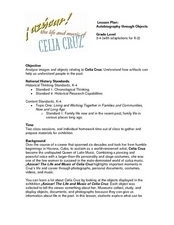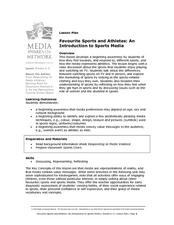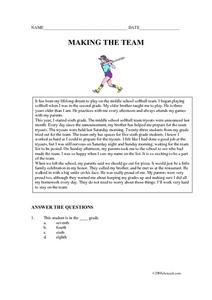National Council of Teachers of English
Writing Acrostic Poems with Thematically Related Texts in the Content Areas
Scholars scour thematically aligned texts to gather a bank of words they can use in an original acrostic poem.
Poetry4kids
Playing With Your Food Poem Lesson
What's more fun than playing with your food? Writing a poem about it! A quick and straightforward lesson guides young writers through the steps of writing a funny, well-structured poem about combining sports and food.
Curated OER
Visualarticulation
Use photographs to teach young special education or speech students how good speech looks, as well as sounds. Kindergarteners are photographed making the F, TH, W, R L, and S sounds. They then use the images to identify each sound that...
Curated OER
Scrabble Fitness
Hop, skip, and jump your way to picking up letters for a word spelling scrabble game. Get a little aerobic conditioning in while having fun with words. Keep the game simple for the younger learners. You might try putting the letters face...
Curated OER
Best Part of Me
After listening to the story, The Best Part of Me, learners will identify a positive physical feature of themselves, and create a descriptive poem about their favorite feature. Photographs are taken, and a nice final draft of the poem is...
Smithsonian Institution
Autobiography through Objects
Show youngsters how objects can tell a story! Here your class will learn about Cuban salsa dancer Celia Cruz by analyzing pictures of her dress, her shoes, and her marriage certificate. After describing Cruz's items and imagining what...
Curated OER
Main Idea in Informational Text
Individuals complete a pre-assessment to gauge their ability to determine the main idea and supporting details in nonfiction text. They examine a new piece of nonfiction reading by looking at the table of contents, headings, and index...
Curated OER
"Ing" Words as Descriptors
This clever instructional activity has your students listen to story about bugs, work together to brainstorm list of "ing" words that describe bugs, create t-chart of words, choose words to place in poem template to create class poem...
Curated OER
The Popcorn Book
Pop, pop, pop! Can you hear the sound popcorn makes when it's being made? Start the day by reading The Popcorn Book. Youngsters will love stringing together popcorn necklaces and learning about popcorn. There are separate prompts and...
Curated OER
Decision Making: Who Was Right?
Help your class explore the question "Is it ever right to disobey a law?" With a strong base of knowledge about the Civil War, anti-slavery movement, and Underground Railroad, your class explores civil disobedience in Marshall, Michigan...
Curated OER
Plagiarism
Don't get caught plagiarizing! Before starting your research unit, use this lesson to help your young writers identify plagiarism. The truth is, many kids don't even realize when they're doing it! They practice citing sources when...
Curated OER
Using Commas with Coordinating Conjunctions
Teach your kids about FANBOYS! Coordinating conjunctions, or FANBOYS, join two independent clauses to make a compound sentence, but don't forget the comma! Review this popular comma rule, and give your learners this short activity. An...
Curated OER
Favorite Sports and Athletes: an Introduction to Sports Media
Even young children watch sports and like team logos and products. It's never too early to think critically about what's onscreen. This exercise develops awareness that media communicate values (i.e. who participates in sports and who...
Curated OER
Vocabulary: Make Connections with New Vocabulary
Connecting meaning to a given word via image or sentence can really help learners build their vocabulary and in turn enhance their reading ability. The class constructs a chart where they define each new vocabulary word, come up with an...
Curated OER
Identify Base Words and Suffixes to Read Multisyllabic Words #1
Show your scholars how adding an affix changes the entire meaning of a word; they focus on the suffix -able. You'll find a complete script here, but if you don't want to read this verbatim, use it simply as an outline. Learners watch you...
Curated OER
Introduce: Comprehension Strategy: Comprehension Monitoring
Help readers develop awareness of comprehension issues and employ tools for better understanding. The best way to begin this strategy is to model it through a think aloud. Choose a book scholars will also be reading, preferably one they...
Pennsylvania Department of Education
6 Traits: Voice
Young scholars explore the trait of voice. In this language arts lesson, students focus on the writing trait of voice. Young scholars view a video and practice writing.
Pennsylvania Department of Education
6 Traits: Word Choice
Students explore language arts by participating in a vocabulary usage activity. In this word choice lesson, students read examples of great word usage in literature and discuss with the class why some words appear stronger than others....
Curated OER
Softball Team
In this language arts worksheet, students read the story about the girl making the softball team and then answer seven multiple choice questions.
Curated OER
Decorating Objects....And Re-Decorating
Students decorate cups or bowls with thematic designs that represent Chinese culture. In this decorating lesson plan, students will decorate their cups or bowls and then “sell” these works of art to partners role-playing as French...
Curated OER
Unscramble the Letters
Students develop their spelling skills. In this language arts lesson, students unscramble words and write sentences to accompany each of them.
Curated OER
Punctuation
In this language arts worksheet, 3rd graders focus on the correct punctuation and capitalization. Students respond to six multiple choice questions.
Curated OER
Journey Home: The Active Learner
Students discuss focus questions prior to reading and preview the book, "Journey Home." In this language arts lesson, small groups present vocabulary words. Students complete after-reading discussion questions and choose writing...
Curated OER
Word Family Nuts
Students explore the English language by participating in a word match activity. In this word family instructional activity, students write a specific word family on a paper squirrel and write words that belong to the family on a paper...

























